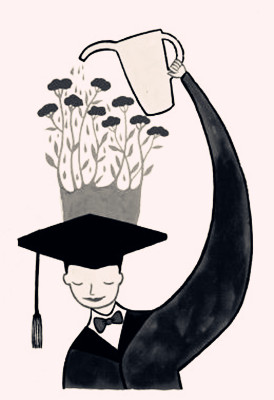
Tony Zhang is one of those who is convinced that graduate business education is not just for investment bankers: he studied for an EMBA at Ceibs when he was already a successful entrepreneur with his popular Tony's Restaurant chain. What could he possibly learn in business school that he did not learn on his mother's farm or in his restaurants' kitchens? "Classmates can be a mirror," he said recently, sitting in the converted shipping container that serves as his ultra-chic office on the organic farm he owns outside Shanghai. "We can't see our own weak points".
許多人都相信,商學研究生教育并不只是適合投資銀行家。張同貴(Tony Zhang)就是這些人中的一員。在中歐國際工商學院攻讀EMBA時,張同貴已然是一位成功的企業家,他經營的連鎖餐廳“多利川菜館”人氣頗旺。他在商學院里到底能學到哪些在他母親的農地、在他餐廳的廚房里學不到的東西?最近,在上海郊外他經營的有機農莊,張同貴坐在用集裝箱改裝的、時尚味道十足的辦公室里這樣說道:“同學可以作為一面鏡子。我們自己是看不到自己身上的弱點的。”
His EMBA taught him what many in China fail to recognise, he says: "A lot of Chinese entrepreneurs blindly choose a business and then just make it bigger and bigger. They ignore the natural limits of the business."
EMBA教給他許多中國人沒有認識到的一條道理。他說:“許多中國企業家盲目選擇了一項業務后,就會把它做得越來越大。他們忽視了這項業務的自然局限。”
"You might be able to carry 100 pounds of weight on your shoulder pole, but if you have to carry 300 pounds, it will crush you," he says, using a suitably agrarian image for China, where farmers carry heavy burdens on opposite ends of long poles. Applying that lesson to the organic food market, he says the maximum penetration of such foods in China is five per cent — and he will not aim higher than that.
“你或許能挑得動100磅重的東西,但如果你非要挑300磅重的東西,你肯定會被壓扁。”他用挑擔這種中國農民常見的勞動做了個形象的比喻,來說明有機食品市場的情況。他說,這類食品在中國的滲透率最多也就是5%,他不會抱比這個數字更高的期望。
Mr Zhang insists that networking was not the main reason he opted for business school though, for many Chinese MBA and EMBAs, networking is paramount. Still, a quick look at the client list of Tony's Farm shows that the contacts he made were invaluable — starting with Ceibs itself, which buys vegetables from him.
張同貴堅稱人脈不是他選擇商學院的主要理由,盡管對許多讀MBA和EMBA的中國人來說,人脈才是第一位的。不過,掃一眼多利農莊的客戶名單就可看出,人脈給張同貴帶來了很大的利益——首先,中歐國際工商學院就從他的農莊采購蔬菜。
But having a business degree is no longer the magic ticket to high salaries that it used to be, says Zhou Xinhua, who works in the internet industry and has an MBA from the Wharton School at the University of Pennsylvania. "A lot of companies now don't care about an MBA, they are much smarter than before," she says, noting that an MBA is a plus — but only for those with experience in a relevant industry.
不過,從事互聯網行業的周新華(音譯)表示,形勢今非昔比,商學學位再也不是神奇的高薪“通行證”。她本人擁有賓夕法尼亞大學沃頓商學院(the Wharton School of the University of Pennsylvania)的MBA學位。她說:“如今許多公司并不在乎MBA,他們比以前精多了。”她指出,擁有MBA學位是一項優勢,但前提是你必須具備相關行業的經驗。
And there is no longer the rush to go overseas to study, says the head of Ceibs' MBA programme, Lydia Price. Lynn Jiang, a Ceibs MBA student, chose Ceibs over Insead because she says if she starts a business in China, she will need a network in China.
中歐國際工商學院MBA學術主任白詩莉(Lydia Price)表示,如今的中國人不會一窩蜂跑到國外讀MBA。Lynn Jiang就在中歐國際工商學院和歐洲工商管理學院(INSEAD)這兩所學院中選擇了前者,她目前正在攻讀MBA。Lynn Jiang說,如果她要在中國創業,她就需要在中國建立人脈。
Ms Zhou spent Rmb1m on her MBA and she still thinks it was worth it. "For that money, I could only buy a restroom in Shanghai," with its stratospheric property prices, she says. With that as a yardstick, Chinese business schools have nowhere to go but up.
周新華當時讀MBA花了100萬元人民幣,但她至今仍認為很值。她說,在房價高企的上海,“這些錢只夠買個衛生間”。基于這一點判斷,中國的商學院必將蒸蒸日上。
譯者:何黎











